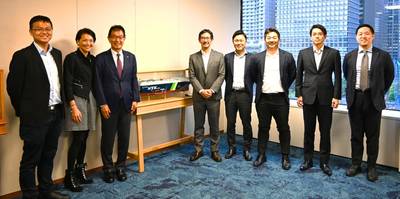GCMD and NYK Line Study Long-Term Biofuel Use
The Global Centre for Maritime Decarbonisation (GCMD) has teamed up with NYK Line to launch Project LOTUS (long-term impact of continuous use of biofuels on vessel operations).
This six-month project will trial the continuous use of a biofuels blend comprising of 24% Fatty Acid Methyl Esters (FAME) and very low sulfur fuel oil (VLSFO) onboard a short-sea vehicle carrier that will call at multiple ports. The use of a vessel plying short-sea routes will allow regular access to fuels stored onboard for sampling and testing during frequent port calls.
FAME, a readily available biofuel derived from second-generation feedstocks, like used cooking oil and palm oil mill effluent, presents a promising fuel alternative for immediate GHG emissions reduction in the shipping industry. While its compatibility with existing engines and bunkering infrastructure makes it an attractive drop-in green fuel, concerns about the impact of its extended use on vessel operations remain.
Unlike conventional marine fuels, one of the challenges with FAME is that it can be more susceptible to chemical degradation and microbial growth, the by-products of which can corrode shipboard engine systems and/ or clog fuel delivery systems.
As a preventative measure, engine OEMs and classification societies have thus recommended increasing the frequency of maintenance when using biofuels and its blends compared to using conventional marine fuels.
The past decade has seen trials of various biofuels onboard vessels. These have primarily focused on their combustion characteristics and the extent of emissions abatement. Data on the impact of long-term and continuous use of biofuels on engine performance and fuel delivery system operations remain limited.
Project LOTUS aims to address this knowledge gap by establishing industry guidelines for monitoring engine and equipment performance when using biofuels. This pilot will also evaluate the total cost of ownership of using biofuels, covering the cost of fuel and additional maintenance costs associated with its use. Additionally, it will identify potential challenges, e.g., corrosion of engine systems and valve failures, related to continuous biofuels use, and recommend mitigation strategies.
The quantitative findings from Project LOTUS offer an opportunity to contribute complementary real-world data to the upcoming revision of ISO 8217:2024, which includes specification of standards for a wider range of FAME-based blends up to B100.
Leveraging its experience from three successful supply chain trials with four vessels for its drop-in green fuel assurance framework, GCMD will lead Project LOTUS in collaboration with industry partners. NYK Line, a co-sponsor, will contribute the vessel and manage fuel procurement. VPS will handle fuel and lube oil analyses and Gard will support GCMD as an insurance and risk assessment consultant on the project.













